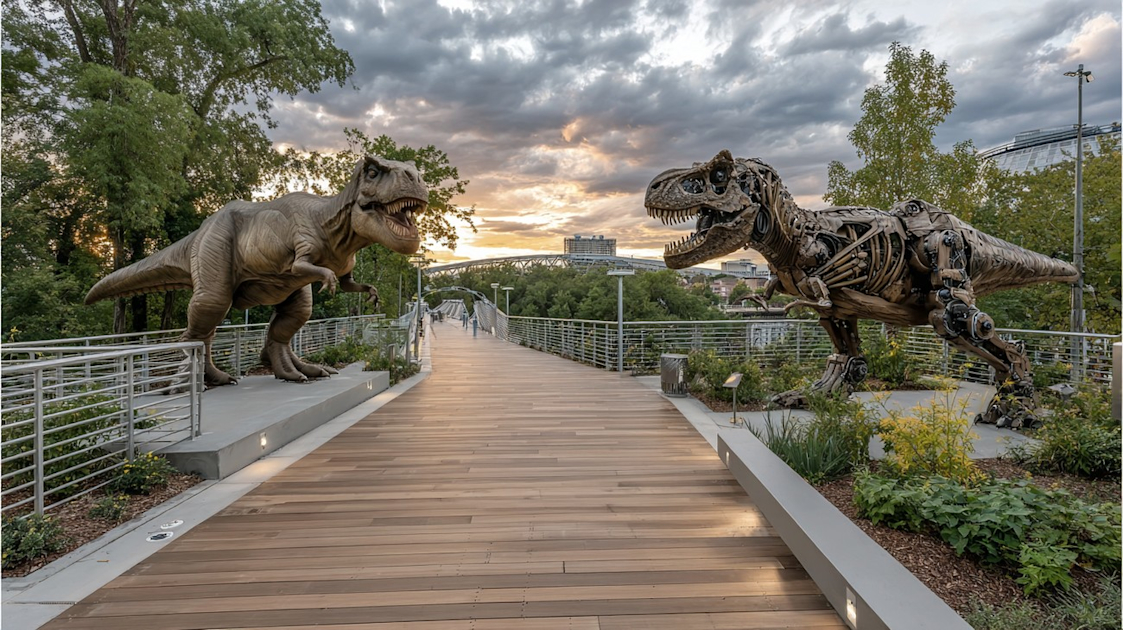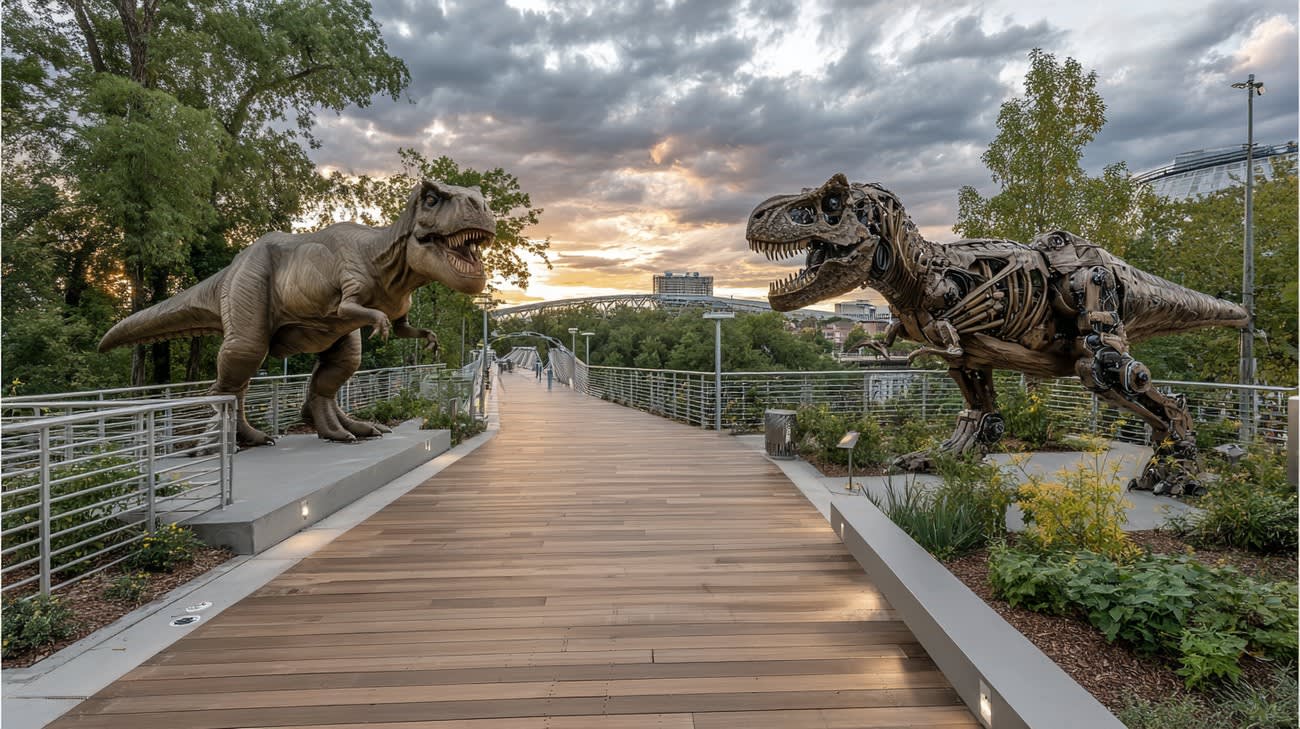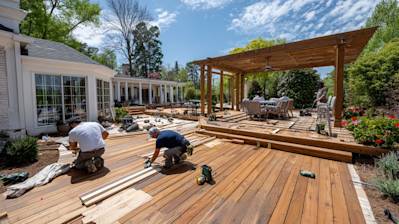When it comes to decking materials, consumers today are spoiled for choice. As the market has evolved, the availability of composite decking has truly revolutionized the industry. Two of the leading brands in this sector are Trex and Timbertech. This comprehensive guide will dissect the unique characteristics, similarities, and differences between these two giants, Trex and Timbertech, to give you a clearer picture of what fits your decking needs best.
A Peek into the World of Trex Decking
Trex is a well-respected name in the composite decking industry. The brand has been in the business since the 1990s, giving it a solid foundation in terms of experience. Let's delve deeper into what Trex offers.
Trex: Unmatched Durability and Stain Resistance
Trex decks are well-known for their robustness. They're made of about 95% recycled materials, including plastic and reclaimed wood. This composite mix gives them an extraordinary level of stain-resistance and durability. It doesn't matter how challenging the climate or weather conditions are, Trex decks will hold up without warping, splintering, or cracking.
Wide Color Palette and Easy Maintenance
One of the prime selling points of Trex is its impressive range of colors and finishes, ranging from the natural wood tones to modern greys. Additionally, the low need for maintenance is a significant advantage for Trex. Unlike traditional wood decks, which require regular painting or staining, Trex decks just need an occasional cleaning using soap and water.
Taking a Closer Look at Timbertech Decking
Timbertech is another heavy hitter in the composite decking world. Like Trex, Timbertech is a renowned name, built on quality and reputation, but what attributes make it unique?
Timbertech: Superior Technology and Versatility
Timbertech proudly maintains an edge on technology and versatility. They offer two different lines of products: capped composite and capped polymer decks. Capped composite boards have a composite core wrapped in a protective shell, whereas capped polymer decks are entirely made of PVC, giving them superior resistance to molding and moisture.
Aesthetic Appeal and Extended Warranty
Timbertech's focus on aesthetics is evident in their product range, from the realistic wooden looks to the longevity of their color. Another attractive aspect of Timbertech is their extended warranty. They offer a 50-year warranty against material defects and a 30-year fade and stain warranty.
Trex vs. Timbertech: The Showdown
Now that we've covered the basics of each brand, it's time for a straight comparison. What makes one stand out against the other?
Cost Considerations
Here's a brief comparison of the cost implications of choosing Trex or Timbertech:
- Trex: Trex decks span three price and quality tiers from least to most expensive: Trex Select, Trex Enhance, and Trex Transcend.
- Timbertech: Timbertech’s product line is divided into three series: Timbertech Edge (most affordable), Timbertech Pro (mid-range), and Timbertech AZEK (most expensive).
Sustainability Factor
Both Trex and Timbertech are committed to sustainability:
- Trex: With Trex's 95% recycled content, they make a strong case for being eco-friendly. Their choice of materials reduces landfill waste and the need for new materials.
- Timbertech: Timbertech also takes sustainability seriously. They source reclaimed wood and recycled plastic to minimize their environmental impact.

Frequently Asked Questions about Trex Vs Timbertech
What is the difference in appearance between Trex and Timbertech?
Trex offers three different lines of products each with its unique appearance. Its premium Transcend line resembles natural wood the most, while the Select and Enhance line have a more realistic wood grain pattern. Timbertech, however, has a wide range of colors and styles. Their Legacy collection has the most realistic-looking colors, and they offer a variety of decking lines with different grain patterns and hues.
How do Trex and Timbertech compare in terms of price?
Typically, Trex decking is a bit more expensive than Timbertech. The cost difference is primarily due to the complexity of the manufacturing process and the inclusion of additional materials in the Trex decking. However, price can vary based on the specific product line and the location of purchase, so it is always a good idea to compare prices before making a decision.
Which one is more durable, Trex or Timbertech?
While both Trex and Timbertech offer high-quality durable products, their warranties differ. Trex offers a 25-year fade and stain warranty on all product lines while Timbertech offers a 30-year fade and stain warranty on its premium lines and a 25-year warranty on their other lines. Both companies cover material defects, splinters, and rot on their composite decks.
How do Trex and Timbertech compare regarding maintenance?
Both Trex and Timbertech are composites, so they require less maintenance than traditional wood decks. They do not need to be stained or sealed. However, they still require cleaning typically with soap and water. Trex can sometimes show stains and mold more readily than Timbertech.
Which one is more eco-friendly, Trex or Timbertech?
Trex prides itself on being an eco-friendly choice because it uses 95% recycled materials, including plastic bags and sawdust. Timbertech, on the other hand, uses a mixture of recycled and new materials. While both are environmentally-friendly compared to traditional wood decking, if being green is a top priority for you, Trex might tip the scales.
How do Trex and Timbertech compare in terms of installation?
Trex and Timbertech have somewhat similar installation procedures. They both recommend hiring professionals for the installation of their products to ensure proper set-up. However, it's worth noting that Trex's product lines, particularly their Transcend line, can be a bit more difficult to work with due to the amount of recycled material in the composite.

TREX
Pros
Durability
Trex is a decking option that is renowned for its long-lasting capabilities. The material is highly resistant to rot and decay, which ensures that it will remain in top-notch condition for an extended time period.
Low Maintenance
Trex decking is very low maintenance. It does not require the same level of upkeep as a natural wood deck. You don't have to sand, paint, or stain it because the color is incorporated into the material itself. Occasional cleaning with soap and water is usually enough to keep it look new and fresh.
Eco-Friendly
Trex is made up of 95% recycled materials, which includes recycled plastics and reclaimed wood. This means it has a significantly reduced environmental impact compared to other types of decking materials.
Variety of Colors and Textures
With Trex, you have plenty of options when it comes to colors and textures. It mimics the look of natural wood but comes with a far greater range of colors, including shades that you wouldn't find in a natural wood setting.
Cons
Cost
One of the biggest downsides to Trex decking is its cost. It's significantly more expensive than traditional wood and other composite decking options. The initial investment is quite high, although it can pay off due to its durability and low maintenance.
Hot in the Sun
Trex decking, like many other composite decking materials, can become quite hot under direct sunlight. This can make it uncomfortable to walk barefoot on in peak summer months.
Susceptible to Scratches
While Trex decking is resistant to most damages, it can be susceptible to scratches. Dragging heavy furniture or the claws of a large pet can potentially mar the surface.
TIMBERTECH
Pros
Long Lifespan
TimberTech composite decking is known for its durability and long lifespan. The composite materials are built to withstand the elements, and as a result, TimberTech decks can last for decades with proper care.
Attractive Style Options
TimberTech offers a range of attractive color and style options, which makes it highly customizable to fit any design vision. They provide options that mimic the look of different natural hardwoods which can enhance the aesthetics of an outdoor space.
Resistance
The composite material of TimberTech decking is resistant to insects, rot, and decay. It will not warp or twist over time, ensuring the longevity of the decking material.
Cons
High Cost
As with Trex, TimberTech is certainly an expensive option. The initial costs for installing a TimberTech deck can be quite high. This expense must be weighed against the long-term benefits of durability and low-maintenance.
Discoloration
TimberTech decks may fade slightly in color when exposed to prolonged periods of direct sunlight. While this is a common issue among composite deck materials, it's still something to consider.
Installation Complexity
Installing TimberTech can be a bit more complex than other decking materials. It requires hidden fastener systems, which can complicate and extend the installation process. It is often recommended that professional installers do the job to ensure it's done correctly.

Myths and Misconceptions about Trex vs Timbertech
There are numerous myths and misconceptions surrounding the Trex vs Timbertech debate. Let's debunk some of them.
Myth 1: Only Trex offers eco-friendly composite decking
The Truth:
Although Trex is often touted as the leader in eco-friendly decking solutions, this doesn't mean that Timbertech doesn't have green options. Timbertech has also committed to producing environmentally friendly decking materials. For example, they use recycled wood and plastic film in their products, much like Trex. So, both brands make an effort to source materials sustainably and reduce their environmental impact.
Myth 2: Timbertech decks are more prone to mold and mildew than Trex decks
The Truth:
There's no evidence to suggest that one brand is more prone to mold and mildew growth than the other. The truth is, any deck, regardless of the brand or material, can develop mold or mildew if it isn't properly maintained. It’s essential to clean and maintain your deck regularly, no matter if you have a Trex or a Timbertech deck.
Myth 3: Trex decks are more durable than Timbertech decks
The Truth:
Both Trex and Timbertech offer high-performance, durable decking. This misconception likely arises from marketing efforts. Trex emphasizes the superior durability of their Transcend line, while Timbertech tends to focus on the long-lasting nature of their AZEK line. In truth, both brands provide high-quality, durable options for decking that can withstand the elements and heavy use.
Myth 4: Timbertech is more expensive than Trex
The Truth:
The cost of a deck can vary greatly depending on the specific product line, the complexity of the installation, and the size of the deck. While Timbertech’s top-tier AZEK line tends to be more expensive than Trex’s equivalent, when you look at the products in the same tier across both brands, the costs are quite comparable. So to claim that one brand is inherently more expensive than the other is a misconception.
Myth 5: Trex offers more color and style options than Timbertech
The Truth:
While Trex does offer a wide range of color and style options, Timbertech matches them stride for stride. Timbertech provides homeowners with an equally impressive array of choices, allowing them to customize their decks to perfectly suit their aesthetic preferences and the architectural style of their homes.
Myth 6: Timbertech's warranty isn't as good as Trex's warranty
The Truth:
Both Trex and Timbertech back their products with robust warranties. Trex offers a 25-year Limited Residential Warranty, while Timbertech offers a similar 30-year Fade & Stain warranty on the TimberTech AZEK line and a 30-year Limited Warranty on the PRO and EDGE lines. So while the terms may differ slightly, both brands stand firmly behind their products.
Remember, when choosing between Trex and Timbertech, consider what truly matters for your deck-building project. It's not about which brand is inherently better, but which one suits your specific needs and preferences in terms of aesthetics, budget, durability, and eco-friendliness. The best way to make a decision is to get the facts straight and dispel any misconceptions.
Summary
So, after comparing Trex vs Timbertech, it's clear that both brands bring something substantial to the decking table. Each has its benefits and unique selling points. Trex offers a wider color range and a slightly lower price point, whereas Timbertech offers impressive durability and warranty protection.
Delving deeper into Trex vs Timbertech, we find that product choice could depend heavily on personal preference and specific individual needs. For those who prioritize earth-friendly products, Trex's commitment to being green could tip the scales. While those valuing longevity might lean towards Timbertech due to their 30-Year Fade and Stain Warranty.
Finally, it appears when choosing between Trex vs Timbertech, there is no definitive loser or winner. Both are leaders in the composite decking industry and have a proven track record with homeowners, builders, and contractors. They both offer high-quality, durable, and aesthetically pleasing decking solutions. Choose based on your specific requirements, budget, and personal taste.
About Pro Tile & Remodeling
Pro Tile & Remodeling is a Greenville, SC-based company that offers top-notch tile installation and comprehensive home remodeling services. With an undying passion for craftsmanship and a keen eye for the tiniest details, we've been enhancing the charm and value of homes throughout the area since our inception. Our team comprises seasoned professionals who skillfully combine their expertise with your ideas to turn your dreams into reality. Whether it's a bathroom redo, kitchen upgrade, or a new tile floor, we pride ourselves on our commitment to quality, sustainability, and customer satisfaction. At Pro Tile & Remodeling, we believe a beautiful home is indeed the happiest place to live in.




